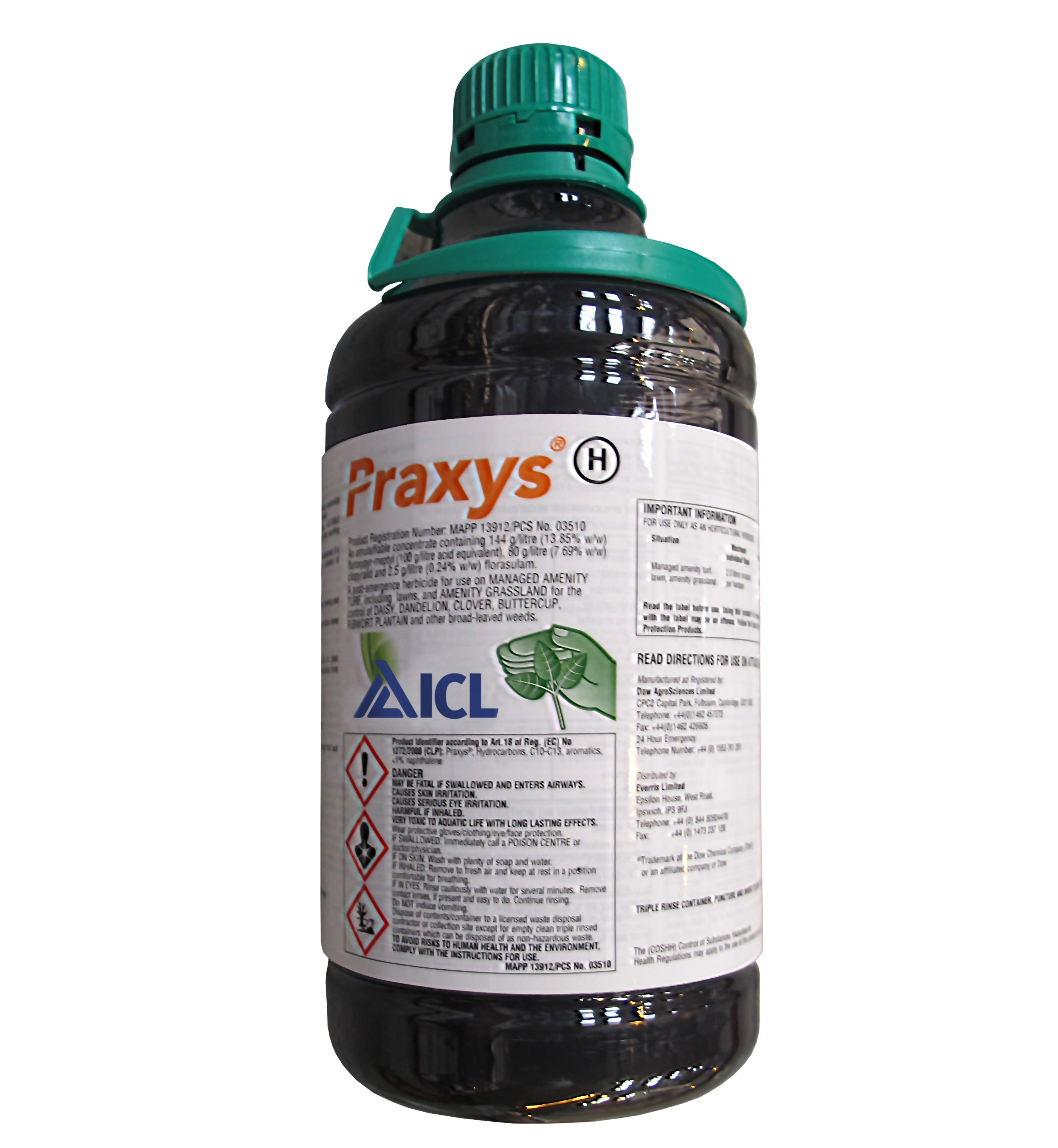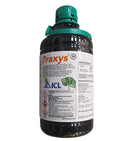Description
Praxys Herbicide
| Product Overview | |
|---|---|
| Product Type | Herbicide |
| Product Name | Praxys |
| MAPP No. | 19820 |
| Active Substances | Clopyralid, florasulam & fluroxypyr |
| Formulation | Emulsifiable concentrate |
| Areas of Use | Managed amenity turf & Amenity grassland |
| Amateur/Professional | Professional |
| Application Window | |||||||||||
|---|---|---|---|---|---|---|---|---|---|---|---|
| Jan | Feb | Mar | Apr | May | Jun | Jul | Aug | Sep | Oct | Nov | Dec |
| Weeds Controlled |
|---|
| Broad-leaved weeds including: |
Praxys is a highly effective systemic penetrant selective contact herbicide for lawns containing three active substances: 80g/l clopyralid, 2.5g/l florasulam and 144g/l fluroxypyr. Once absorbed into the plant, the active substances are translocated to provide complete control of the whole plant. Absorption is through both leaves and roots of target plants, increasing the effectiveness of the herbicide.
Flexible application rates enable the user to reduce both costs and pesticide loading according the weeds being treated. Praxys Selective Herbicide is a weed killer that offers excellent control of a wide range of broad-leaved weeds including clover, daisy, buttercup and ribwort plantain in a concentrated formulation that provides high performance.
Praxys can be used at a rate of 1-2l/ha in 100-400l/ha water.
Product Benefits
- Combines three active substances
- Rapid absorption into target plants
- Complete control of the whole plant from root to tip
- Rainfast within one hour
- High selectivity to both established and young turf
Instructions for use
Where to use
Praxys can be used in all amenity grassland and managed amenity turf situations where the clippings will not be collected for use in mulch, compost or green waste and where the land will not be grazed or used for animal feed or bedding.
- Amenity grassland: Areas of semi-natural or planted grassland subject to minimal or non-intensive management
- Managed amenity turf: Areas of frequently mown, intensively managed turf including all types of sports turf, golf greens , tees and fairways
When to use
Praxys can be used between 1st February to 30th September and is most effective when used to treat weeds that are small and actively growing.
How to use
Praxys can be applied using either a knapsack or a tractor mounted boom sprayer using a medium spray quality nozzle:
- Half fill the spray tank with water
- Add the required amount of Praxys and agitate to ensure thorough mixing
- Add the remaining water and continue to agitate
- Maintain agitation of the spray solution whilst spraying
- After spraying clean all spraying equipment inside and out, using a suitable spray tank cleaner
- Avoid cutting the grass for three days before and after application to ensure sufficient weed leaf surface is present to allow uptake and translocation of Praxys
Additional Information
- Do not use where clippings are collected for use in mulch, compost or green waste
- Do not use on land that will be grazed by livestock or where vegetation will be used for animal feed or bedding within 12 months of treatment
- Avoid contact with non-target plants
- Allow an interval of four weeks between application and re-seeding
- Avoid applying when turf is wet or under stress
Active Substances
Clopyralid and Fluroxypyr
Bio-Chemical Mode of Action: Clopyralid and Fluroxypyr belong to the synthetic auxins group of herbicides.
Synthetic auxins work by inducing rapid abnormal cell growth and development in the stems, petioles and leaves of susceptible plants causing cell bursts and ultimately cell and plant death.
Mobility: Clopyralid and Fluroxypyr are systemic penetrants which means that the active substance can be translocated downwards through the plant within the phloem (sugar conducting tissues) and upwards through the plant within the xylem (water conducting tissues).
Application timing: Systemic auxins are best applied when the weeds are actively growing. They are generally more effective when target plants are younger and in their vegetative phases.
Resistance: The incidences of resistance to synthetic auxins remains relatively low which is assumed to be because the herbicide has multiple sites of action.
However, resistance to synthetic auxins has been observed globally with 36 species being confirmed as resistant as of 2017. Best management practices, such as alternating with products with a different mode of action and using cultural weed control methods, will help to reduce the risk of further resistance.
Florasulam
Bio-Chemical Mode of Action: Florasulam belongs to the ALS (Acetolactate Synthase) Inhibitors group of herbicides.
Acetolactate synthase is an important enzyme involved in the biosynthesis of branched-chain amino acids. ALS inhibitors interrupt this process causing the plant to initially become chlorotic before necrosis of plant tissues followed by whole plant death occurs.
Mobility: Florasulam is a systemic penetrant which means that the active substance can be translocated downwards through the plant within the phloem (sugar conducting tissues) and upwards through the plant within the xylem (water conducting tissues).
Application timing: ALS inhibitors are best applied when the weeds are actively growing. They are generally more effective when target plants are younger and in their vegetative phases.
Resistance: Resistance to ALS inhibitors is a relatively frequent occurrence due to their high activity on sensitive biotypes and soil residual activity. Best management practices, such as alternating with products with a different mode of action and using cultural weed control methods, will help to reduce the risk of further resistance.
For further information regarding Praxys Selective Herbicide 2L, please contact our technical sales team on 01902 440250.
Technical Information
Safety Data Sheet
SKU - 15600
Product Label
SKU - 15600
Delivery and Returns
Delivery charge (if applicable) applied at checkout. Next working day delivery is available on some products, as an option on orders placed before 1pm - excludes festive season & bank holidays. Please note deliveries to Highlands, Cornwall and more remote areas may take longer. Surcharges apply for non mainland locations, call for more information - More delivery information.
We require deliveries to be signed for. If no one is available to sign for your delivery, you may request it is left in a safe place by leaving a signed note for the driver, requesting the item is left without a signature. Please note that this is left at your own risk and at the driver's discretion.
For large orders, please be aware that if you require a smaller 7.5 tonne lorry, the maximum weight for pallets is 750 kg - otherwise the standard pallet size limit of 1000 kg applies.
Please note:
- For deliveries that require a pallet, the pallet/packaging itself is the customer's responsibility and will not be uplifted or taken upon delivery.
- Deliveries are kerb side only.
- It is possible a pallet order can be delivered on a vehicle up to the size of a 26T lorry.
If you have any access restrictions for lorries or large vehicles please speak to our sales team on 01902 440250.
Collection from our Telford, Shropshire, Trade Counter is available for this product - More collections information.
Safe use of pesticides
The purchaser and/or end users are responsible for ensuring that these products are used in line with industry Approved Codes of Practice. All operators must be trained and certificated in using and applying any Ministry Approved professional product.
Please be aware that by proceeding you are purchasing a professional pesticide product.
You must ensure the end user of these products complies with the DEFRA/HSE Code for the Safe use of Pesticides:
"By law, everyone who uses pesticides professionally must have received adequate training in using pesticides safely and be skilled in the job they are carrying out."





